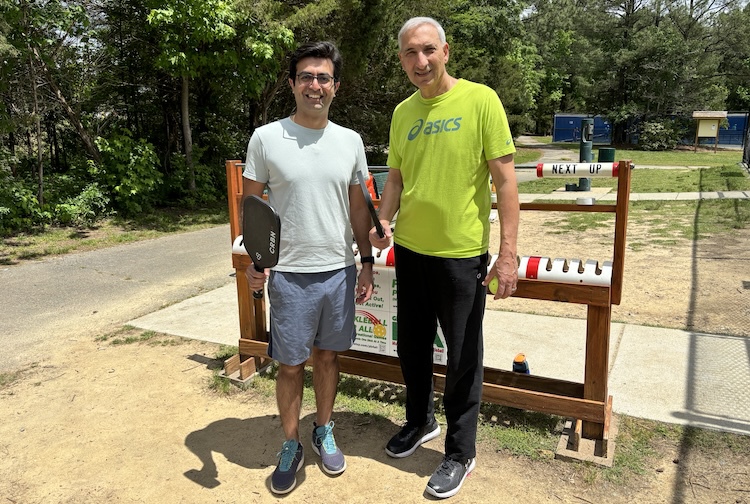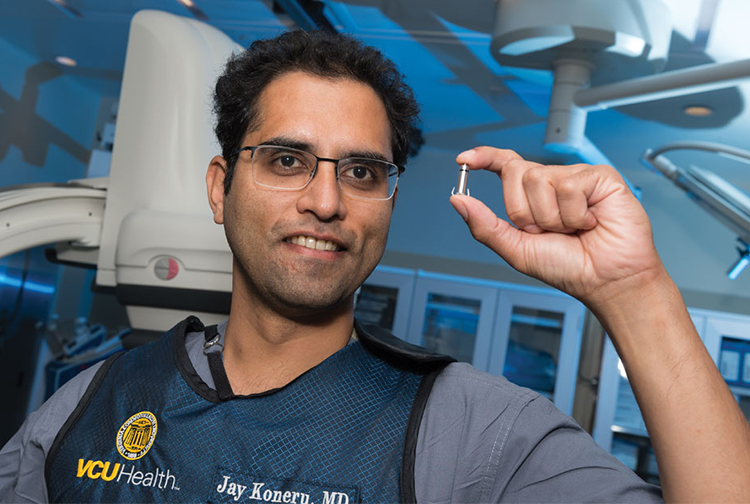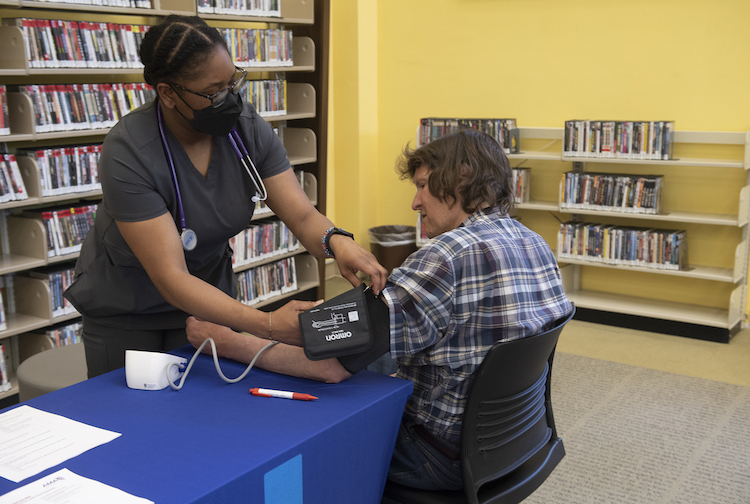
Pickleball as prevention: How staying active can drastically reduce your risk for heart disease
Anurag Mehta, M.D., director of preventive cardiology at the VCU Health Pauley Heart Center, bonds with his patient on the pickleball court.
May 14, 2024 Anurag Mehta, M.D. and Andy Randazzo play pickleball together in Henrico County. Their wives also join in on the fun. (Left to right: Mehta and Randazzo) (Contributed photo)
Anurag Mehta, M.D. and Andy Randazzo play pickleball together in Henrico County. Their wives also join in on the fun. (Left to right: Mehta and Randazzo) (Contributed photo)
By Liz Torrey
“Do as I do – and as I say.”
You could call this the motto of Anurag Mehta, M.D., director of preventive cardiology at the VCU Health Pauley Heart Center. He emphasizes the vital importance of physical activity and regular exercise to all his heart patients—and follows his own advice to boot.
Just ask patient Andy Randazzo.
“I was playing pickleball, and all of a sudden, I was like, ‘Wait a minute – is that my cardiologist?’” Andy recalled.
Randazzo and Mehta both play pickleball, usually with their wives, at Pouncey Tract Park in Glen Allen, a suburb of Richmond. They’ve bumped into each other quite a few times on the courts since Randazzo became a Pauley Heart patient in June 2023.
Randazzo has a family history of heart attack and heart disease, and in recent years his heart health has become top of mind. Not only have these health concerns led him to work out at the pickleball courts more — they also brought him to VCU Health.
Preventive testing to learn about heart disease risks
On the advice of a family member who is a cardiologist, Randazzo underwent a calcium scoring test. This simple, painless diagnostic procedure can identify conditions associated with an increased risk of heart disease — such as hardened arteries — at an early stage, often before symptoms are present.
The test involves a CT scan, which generates cross-sectional images of the arteries that supply blood to the heart; the images are then reviewed for deposits of calcium in the arteries.
“I use this test frequently in my practice,” Mehta said. “It’s very useful on multiple grounds. If you don’t have coronary artery calcium, the chances of you having a heart attack or even a stroke in the next five to ten years is very low. But if you have a high calcium score, that tells us a lot about your risk of having heart problems down the line, and your blood vessels are hardening through a disease process called atherosclerosis.”
I’ve trusted VCU for my healthcare in the past. I’ve always felt that VCU Health focuses on doing the right thing, and I’ve always been satisfied with all my physicians there.
Andy Randazzo, VCU Health patient
Calcium deposits are caused by plaque buildup in the arteries. Plaque is a composite of many substances, including cholesterol and other fats, inflammatory cells, fibrous tissue, and calcium.
“Calcium deposition is essentially a marker of the final stages of atherosclerosis,” Mehta said. “Your body is trying to heal and stabilize that plaque. Essentially, your arteries are becoming bone.”
A calcium score of between 100 and 400 means a patient has a moderate to high risk of heart attack or other forms of heart disease over the next ten years; a score of more than 400 indicates extensive calcium deposits and a high risk of heart attack.
Randazzo’s score was 200, and his primary care physician recommended that he see a cardiologist.
“I’ve trusted VCU for my healthcare in the past,” Randazzo said. “I’ve always felt that VCU Health focuses on doing the right thing, and I’ve always been satisfied with all my physicians there. So, when my PCP asked me to see a cardiologist, I reached out to the Pauley Heart Center.”
Know your risk for heart disease
Under the care of Mehta, Randazzo first underwent several tests to better understand his risks for heart disease and other serious heart conditions. First, he had an echocardiogram — an ultrasound of the heart — which revealed the volume of blood being pumped out of his heart was lower than it should be. This volume measurement is referred to as the ejection fraction. A low ejection fraction can be caused by several different conditions, including atherosclerosis, high blood pressure, and diabetes.
Randazzo then had a cardiac MRI with stress testing for more detailed images of his heart and its blood flow. This was followed by a cardiac catheterization and coronary angiography. In this procedure, a tube is guided through a blood vessel to the heart, where it is used to both test for and treat clogged arteries.
In Randazzo’s case, no significant blockages or narrowing of the arteries were found during his cardiac cath.
“With all of this information — the family history, the calcium score, the low ejection fraction on both the echo and the MRI, but no evidence of significant blockages on catheterization — the goal then becomes: how do we protect your cardiovascular health and prevent cardiovascular disease five, ten, twenty years down the line?” Mehta said. “One thing we can do is use generic, widely available medications to control and curb the risk factors responsible for the development and progression of heart disease.”
Preventative approaches to improve heart health
Randazzo now takes blood pressure medication, cholesterol medication, and aspirin to keep his heart healthy in the short and long term.
“But when it comes to preserving your health, as important — maybe even more important — than medication is physical activity and exercise,” Mehta continued. “I can’t stress enough how essential it is for anyone and everyone to get aerobic exercise and muscle training. It’s highly protective for your heart in the long run.”
This is where pickleball comes in.
Randazzo says he took up the sport during the COVID-19 pandemic, when he was “stuck at home” and needed an activity that would allow him to get out and socialize safely. But he notes that even outside the pandemic, life had slowed him down in different ways.
Research shows that when you transition from a sedentary lifestyle to even being just a little bit physically active, you get the biggest bang for your buck. Something that I share with all of my patients... is that even small amounts of physical activity done consistently are extremely beneficial.
Anurag Mehta, M.D., VCU Health Pauley Heart Center
“I’ve always been interested in physical activity, and I’ve played pretty much every sport there is,” he said. “But as we get older, as we get into our jobs, you’re pretty much stuck at your desk all day. That of course impacts you long-term because you’re not active.”
He has also seen how many desk-based or corporate jobs have become significantly more stressful in recent decades. In some instances, “the job becomes your life,” he continued. “The stress not only has a mental toll on you — it also has a physical toll.”
Randazzo chose to take up pickleball in part because it is not as strenuous as tennis or other sports he had played previously.
“Unfortunately, as we get older, things like your knees start to give out, and it’s a little bit harder to get moving,” he said. “But to me, it’s always seemed like doing something is better than doing nothing.”
Mehta couldn’t agree more with this sentiment.
“Research shows that when you transition from a sedentary lifestyle to even being just a little bit physically active, you get the biggest bang for your buck,” he said. “Something that I share with all of my patients — especially those who are in a demanding job, or who have young kids, or any other lifestyle factors that might prevent them from making time for exercise — is that even small amounts of physical activity done consistently are extremely beneficial.”
For his part, Mehta squeezes in time for exercise by meeting his wife at the courts and fitting in 30 to 60 minutes of pickleball before picking up their son from daycare. But he acknowledges that finding time for any physical activity can be a challenge for a variety of reasons beyond the logistical.
“I’m very thankful to, for example, Henrico County for prioritizing parks,” he said. “These are public courts, they’re free, they’re available all the time, there’s good lighting for those who want to play in the evening, there’s a playground nearby for those with children. Sometimes our health comes down to things that are beyond our direct control: health policy, having access to walking spaces or good quality food. All of those things play a huge role in population cardiovascular health.”
Like Randazzo, Mehta notes the Pouncey Tract pickleball courts are “an amazing place to socialize.”
“Playing pickleball, I’ve become friends with everyone from teenagers to people in their eighties—and of course, my patient Andy here,” he said. “The social benefits of physical activity, which we maybe don’t talk about as much, are also very important for your health.”
“My reflexes aren’t what they used to be, I don’t move as fast as I used to, but it’s not about winning when we go there,” Randazzo agreed. “It’s just about having a good time.”
“That said, I promise to go easy on Dr. Mehta next time we play,” he couldn’t help but add.



